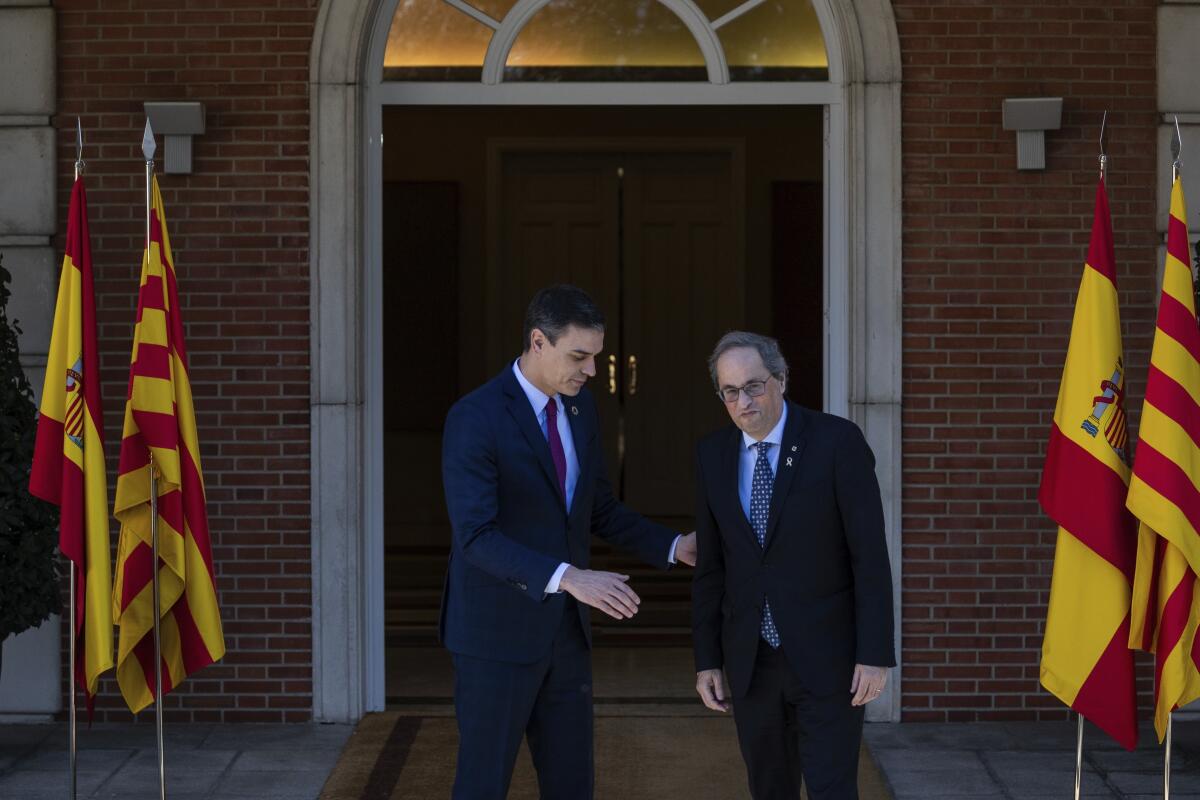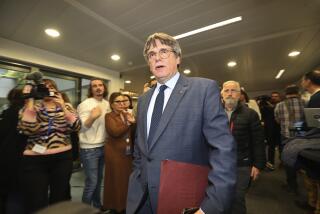Leaders of Spain and Catalonia open long-awaited talks on region’s political future

BARCELONA, Spain — The governments of Spain and its Catalonia region opened a highly anticipated series of negotiations on Wednesday about the future of Spain’s wealthy — and rebellious — northeastern region. The talks could represent the greatest opportunity in some time for a peaceful resolution that would give the region greater autonomy.
The Catalans went to Madrid with two clear proposals: retroactively legalize a 2017 referendum on independence and give amnesty to politicians in prison and in exile.
The Spanish government, long opposed to Catalan independence, came into the meeting with a 44-point agenda for better cooperation between the governments. Proposals included reforming the way the central government redistributes funding to Spain’s 17 autonomous communities — secessionists complain that Catalonia contributes more tax money to the central government than it receives in return — and exhuming the bodies of Catalans killed by Gen. Francisco Franco’s nationalists during the Civil War of 1936-39.
Although it may take months, or even years, to reach an agreement — the terms of which are far from clear — participants and observers remarked that the fact the two governments sat together at a negotiating table was an important step to resolving gridlock.
“This road will be difficult, complex, and long,” Prime Minister Pedro Sánchez told the Spanish parliament Wednesday morning. “The motivation of this government is that this road has a destination, and the destination is the reunion of Catalans and the reunion of Catalonia with the rest of the country.”
For secessionist lawmakers, the start to the negotiations shows that the central government has recognized their legitimacy as representatives of the Catalan people.
“Now we have been acknowledged and officially recognized by the Spanish government as a counterpart,” Catalan Foreign Minister Alfred Bosch said. “These talks are government to government, on equal terms.”
Looming large over the meeting were those who were not in attendance: former Catalan President Carles Puigdemont, who in 2017 fled to Belgium after declaring Catalonia independent, and former Vice President Oriol Junqueras, who was sentenced to 13 years in jail for his involvement in the 2017 referendum.
According to current Catalan President Quim Torra, he and his fellow negotiators — seven secessionist lawmakers — communicated with Puigdemont and Junqueras while drawing up Wednesday’s strategy.
“The voices in exile and in prison had to be present,” Torra said in an interview.
He added: “It would be difficult for us to go to the negotiations” without discussions on amnesty and a legalized referendum.
Tension in Catalonia erupted in the fall of 2017. On Oct. 1, a low-turnout referendum — deemed unconstitutional by the Spanish government — went in favor of independence, and a few weeks later Catalan lawmakers declared the region separate from Spain.
The Spanish government, then led by conservative Prime Minister Mariano Rajoy, sent thousands of police officers to Catalonia to prevent the vote. In response to the declaration of independence, Rajoy dissolved the Catalan parliament, took control of the region and sent out arrest warrants for Puigdemont and his colleagues.
But months later, in June 2018, Rajoy was ousted in the aftermath of a corruption scandal enveloping his party. Sánchez, of the Socialist Workers’ Party, took the reins of a caretaker government, expressing willingness to open a dialogue with the Catalans.
In early 2019, initial talks between Sánchez and Torra fell apart. Sánchez, meanwhile, called general elections twice last year — and was sworn into office last month only after agreeing to negotiate with the Catalan government.
Now, Sánchez comes to the negotiations table as leader of Spain’s first-ever coalition government between the Socialists and the leftist party Podemos. Podemos leader and Spanish Vice President Pablo Iglesias will probably function as a mediator in the talks, some observers say, because of his party’s openness to resolve the Catalan conflict and his new role in the Spanish government.
Negotiations also come several months after Spain’s Supreme Court sentenced 12 secessionist leaders to prison for their involvement in organizing the 2017 referendum.
The talks, both Spanish and Catalans lawmakers agree, are long overdue. Secessionist sentiment in Catalonia exploded in 2010 when the country’s constitutional court annulled several articles of the region’s 2006 statute of autonomy and abolished references to Catalonia’s nationhood. Two years later, hundreds of thousands of protesters took to the streets calling for a referendum on independence. The region held a largely symbolic referendum in 2014.
Massive protests have cycled throughout the region ever since.
“We’ve seen this strong increase in secessionist sentiment over the years, and the constant demand from Catalan leaders was the necessity of talking with the Spanish state to find an agreement, a solution to the crisis,” said Ignacio Sánchez-Cuenca, a political scientist at Madrid’s University of Carlos III. “That’s why, in my judgment, this table of negotiation should have happened nine or 10 years ago.”
It is unclear how long such talks could last, nor their result. Negotiations between the Spanish government and the Basque armed nationalist group Euskadi Ta Askatasuna — which, unlike the Catalans, used violence as a means to seek independence — went on for decades amid a domestic terrorist conflict. Formed in 1959, the militant group officially announced its dissolution in 2018.
Negotiations could also be disrupted by Catalan elections, which Torra promised to call after passing the year’s budget. Division between the main secessionist parties — Torra’s Together for Catalonia and Junqueras’s Republican Left — could result in Torra losing his position as Catalan president.
Meanwhile, Catalan lawmakers and the Spanish government have reopened a bilateral commission to discuss topics that have gone mostly untouched since the conflict’s climax in 2017, including infrastructure and education.
University of Barcelona political scientist Francesc Amat was skeptical that the two sides could find common ground on the Catalans’ two major demands. Nor was he certain how the two sides could engage in meaningful dialogue before Catalonia’s elections this year.
It’s clear the conflict won’t be resolved quickly.
“It will be a long process,” Sánchez-Cuenca said. “Many years have passed without dialogue, and now the political register has completely changed. Negotiations like this are going to cost both sides. It’s like a Russian mountain. There will be many ups and downs.”
Bernhard is a special correspondent.
More to Read
Sign up for Essential California
The most important California stories and recommendations in your inbox every morning.
You may occasionally receive promotional content from the Los Angeles Times.










